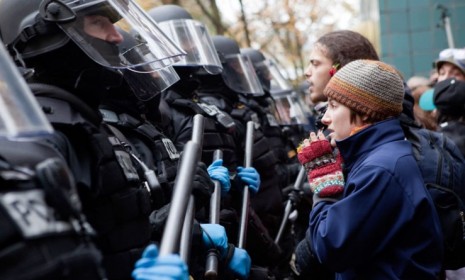- Select a language for the TTS:
- UK English Female
- UK English Male
- US English Female
- US English Male
- Australian Female
- Australian Male
- Language selected: (auto detect) - EN
Play all audios:
BACK on April 5, in an effort to add some constructive thoughts to the debate at the time on the subject of wearing face masks, I took the time and trouble to email both my experience and my
concerns to Professor Chris Whitty, the Government’s Chief Medical Officer. I never even received the courtesy of a reply, much less did I feel that my comments had at least been noted.
Now, three months later, scientists are now saying that everyone should wear a mask. If they go out of the house, this will reduce the risk of the virus being spread by people breathing it
in as well as people breathing it out, especially as they may not even know they have the virus if they don’t have any symptoms. Prof Whitty, I hate to say I told you so, but most of what
follows is exactly what I emailed to him three months ago. Back in the mid-1970s (when Prof Whitty was still only aged 10) I spent two years in the United States as a Jesuit novice. As part
of our pastoral experiences, two of us were involved in social services supporting families attending a cancer research centre in Seattle where the process of bone marrow transplantation was
being pioneered. Once patients had had their immune system suppressed, the risk of infection was extremely high and so, apart from being in special rooms with outward-flowing filtered
air-condition systems, anyone entering their rooms was required to wear a face mask which had only recently been developed (similar to a dust mask and repurposed by 3M from the stiffening
cups it made for bras) in order to further guard against any risk of transmitting infection from the wearer to the patient. Read More Here’s how you should and shouldn’t wear a face mask -
according to experts The effectiveness of those masks was further demonstrated when patients for whom the treatment had been successful travelled home afterwards (usually by plane to
different parts of the United States and overseas), and were required to wear a mask as a safeguard against any risk of infection from other passengers. The “experts” have continued to claim
all along that face masks are not intended to protect the wearer, but rather to guard against the wearer infecting others. But why not encourage everyone to wear one anyway on the basis
that who knows who is infected and who isn’t? Surely any barrier is better than no barrier at all – which is why we are used to seeing people in Asian countries wearing them as a barrier
against breathing in air pollution, and it obviously works or they wouldn’t wear them. I think it would be true to say that the type of masks we are talking about (the dust mask type, or the
layered paper or cloth type as opposed to masks fitted with filters) can’t offer 100 per cent protection – especially if they are not fitted properly – and therefore people who wear them
should still be cautious about the situation they are in, maintaining social distancing just the same. But given that any barrier is better than no barrier, why is the Government promoting
the wearing of masks only on public transport and in shops for example, rather than recommending that everyone wear them wherever they are (as other countries have done) so that as much
protection as possible is provided against the virus being spread whether breathing it in or breathing it out? We are already doing as much as we have been asked to do for our own good and
to protect other people, but the one thing we are still not being told to do is for everyone to wear a face mask whenever we have to be out and about. It can’t do any harm and could surely
do a lot of good, and yet the Government persists with its policy of “face coverings are not intended to protect the wearer”. Why not if they could? If everyone is wearing a face mask then
there is no longer the same level of risk of anyone passing on the virus or of catching it. Does the Government have to learn the hard way, just as it has regarding the failure to introduce
a lockdown as early as it should have done, or its failure to give due regard to care home patients and staff? Apparently, and sadly, yes it does. Indeed the Prime Minister has received, and
appears to continue to receive, some appalling advice. And who is his chief adviser and why is he still? Enough said. Neil McNicholas is a parish priest in Yarm. _Editor’s note: first and
foremost - and rarely have I written down these words with more sincerity - I hope this finds you well. _ _Almost certainly you are here because you value the quality and the integrity of
the journalism produced by The Yorkshire Post’s journalists - almost all of which live alongside you in Yorkshire, spending the wages they earn with Yorkshire businesses - who last year took
this title to the industry watchdog’s Most Trusted Newspaper in Britain accolade._ _And that is why I must make an urgent request of you: as advertising revenue declines, your support
becomes evermore crucial to the maintenance of the journalistic standards expected of The Yorkshire Post. If you can, safely, please buy a paper or take up a subscription. We want to
continue to make you proud of Yorkshire’s National Newspaper but we are going to need your help._ _Postal subscription copies can be ordered by calling 0330 4030066 or by emailing [email
protected]. Vouchers, to be exchanged at retail sales outlets - our newsagents need you, too - can be subscribed to by contacting subscriptions on 0330 1235950 or by visiting
__www.localsubsplus.co.uk__ where you should select The Yorkshire Post from the list of titles available. _ _If you want to help right now, download our tablet app from the App / Play
Stores. Every contribution you make helps to provide this county with the best regional journalism in the country. _ _Sincerely. Thank you. _ _James Mitchinson_








